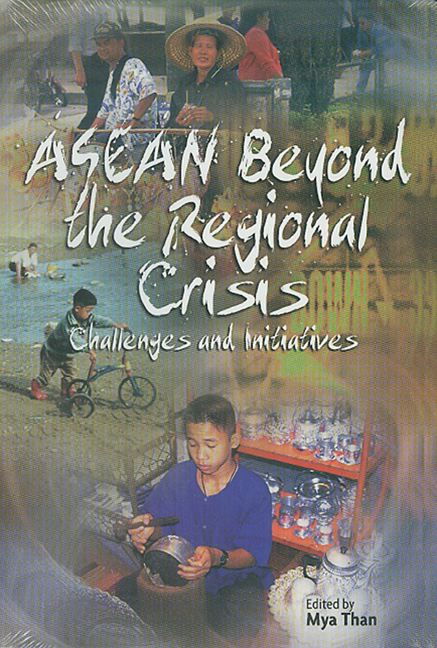Book contents
- Frontmatter
- Contents
- List of Tables
- List of Figures
- Glossary
- Contributors
- 1 ASEAN Beyond the Crisis: A Bird's-eye View
- 2 East Asia: Crisis and Recovery
- 3 Competitiveness and Sustainable Growth in ASEAN
- 4 ASEAN Free Trade Area: Progress and Challenges
- 5 ASEAN Investment Area: Progress and Challenges
- 6 Financial and Macroeconomic Co-operation in ASEAN: Issues and Policy Initiatives
- 7 Food Security in ASEAN
- 8 ASEAN Co-operation and the Environment
- 9 ASEAN and the International Trading System: Regional Trade Arrangement vs. the WTO
- 10 ASEAN and Its Inter-Regional Economic Links
- Appendix I ASEAN's Relevance: Has It Become Questionable?
- Appendix II Is ASEAN Still Relevant? Some Thoughts from a European Perspective
- Index
1 - ASEAN Beyond the Crisis: A Bird's-eye View
Published online by Cambridge University Press: 03 November 2017
- Frontmatter
- Contents
- List of Tables
- List of Figures
- Glossary
- Contributors
- 1 ASEAN Beyond the Crisis: A Bird's-eye View
- 2 East Asia: Crisis and Recovery
- 3 Competitiveness and Sustainable Growth in ASEAN
- 4 ASEAN Free Trade Area: Progress and Challenges
- 5 ASEAN Investment Area: Progress and Challenges
- 6 Financial and Macroeconomic Co-operation in ASEAN: Issues and Policy Initiatives
- 7 Food Security in ASEAN
- 8 ASEAN Co-operation and the Environment
- 9 ASEAN and the International Trading System: Regional Trade Arrangement vs. the WTO
- 10 ASEAN and Its Inter-Regional Economic Links
- Appendix I ASEAN's Relevance: Has It Become Questionable?
- Appendix II Is ASEAN Still Relevant? Some Thoughts from a European Perspective
- Index
Summary
Leaving behind the worst part of the “Asian flu”, ASEAN is entering the new post-crisis era. With the entry into the new era, ASEAN will have to contend with new challenges and unresolved issues as well as opportunities in terms of political, strategic, institutional, economic, and social and cultural dimensions.
As the regional financial and economic crisis seems to have bottomed out, and ASEAN economies are on the recovery path, it would be opportune to carry out a post-mortem on the crisis to evaluate the sustainability of the recovery and the long-term direction of the ASEAN economies. In addition, as challenges and competitiveness have become significant issues for the ASEAN economies in the post-recovery process, it is important to address these issues. Similarly, after achieving the ASEAN Free Trade Area's (AFTA's) objectives by 2002, as pledged by all members at the Hanoi Summit in 1998, the progress of AFTA should be analysed, and challenges explored in order to deepen ASEAN co-operation. Many academics and policy-makers have questioned whether ASEAN should perhaps go beyond the free trade area to an economic union, following the example of the European Union (EU).
The thirty years experience of ASEAN indicate that the member countries still have much room to improve in economic and financial co-operation. The fact that ASEAN cannot solve the regional crisis on its own shows that it is important to take measures towards avoiding a recurrence of another crisis. Although ASEAN has already agreed to introduce a surveillance mechanism, to establish an ASEAN Investment Area (AIA), the ASEAN Vision 2020, and an “ASEAN roadshow” to promote trade and investment, there is a need to reassess ASEAN economic and financial co-operation.
To address the economic issues alone is not enough; there are also issues encompassing human and social dimensions, such as food security, poverty, and cross-border pollution to be dealt with.
Furthermore, in the wake of the regional crisis, ASEAN has been criticized as being ineffective. Many suggest that ASEAN needs to change to meet its future needs of peace, stability, and prosperity in the region with confidence as it moves into the information age. In other words, there is a need to evaluate ASEAN on whether it is still relevant in its present form and contents, and if not, what changes should be introduced.
- Type
- Chapter
- Information
- ASEAN Beyond the Regional CrisisChallenges and Initiatives, pp. 1 - 10Publisher: ISEAS–Yusof Ishak InstitutePrint publication year: 2001



